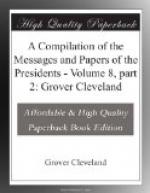From the report of the Secretary of War it appears that the only outbreaks of Indians during the past year occurred in Arizona and in the southwestern part of New Mexico. They were promptly quelled, and the quiet which has prevailed in all other parts of the country has permitted such an addition to be made to the military force in the region endangered by the Apaches that there is little reason to apprehend trouble in the future.
Those parts of the Secretary’s report which relate to our seacoast defenses and their armament suggest the gravest reflections. Our existing fortifications are notoriously inadequate to the defense of the great harbors and cities for whose protection they were built.
The question of providing an armament suited to our present necessities has been the subject of consideration by a board, whose report was transmitted to Congress at the last session. Pending the consideration of that report, the War Department has taken no steps for the manufacture or conversion of any heavy cannon, but the Secretary expresses the hope that authority and means to begin that important work will be soon provided. I invite the attention of Congress to the propriety of making more adequate provision for arming and equipping the militia than is afforded by the act of 1808, which is still upon the statute book. The matter has already been the subject of discussion in the Senate, and a bill which seeks to supply the deficiencies of existing laws is now upon its calendar.
The Secretary of War calls attention to an embarrassment growing out of the recent act of Congress making the retirement of officers of the Army compulsory at the age of 64. The act of 1878 is still in force, which limits to 400 the number of those who can be retired for disability or upon their own application. The two acts, when construed together, seem to forbid the relieving, even for absolute incapacity, of officers who do not fall within the purview of the later statute, save at such times as there chance to be less than 400 names on the retired list. There are now 420. It is not likely that Congress intended this result, and I concur with the Secretary that the law ought to be amended.
The grounds that impelled me to withhold my signature from the bill entitled “An act making appropriations for the construction, repair, and preservation of certain works on rivers and harbors,” which became a law near the close of your last session, prompt me to express the hope that no similar measure will be deemed necessary during the present session of Congress. Indeed, such a measure would now be open to a serious objection in addition to that which was lately urged upon your attention. I am informed by the Secretary of War that the greater portion of the sum appropriated for the various items specified in that act remains unexpended.
Of the new works which it authorized, expenses have been incurred upon two only, for which the total appropriation was $210,000. The present available balance is disclosed by the following table:




